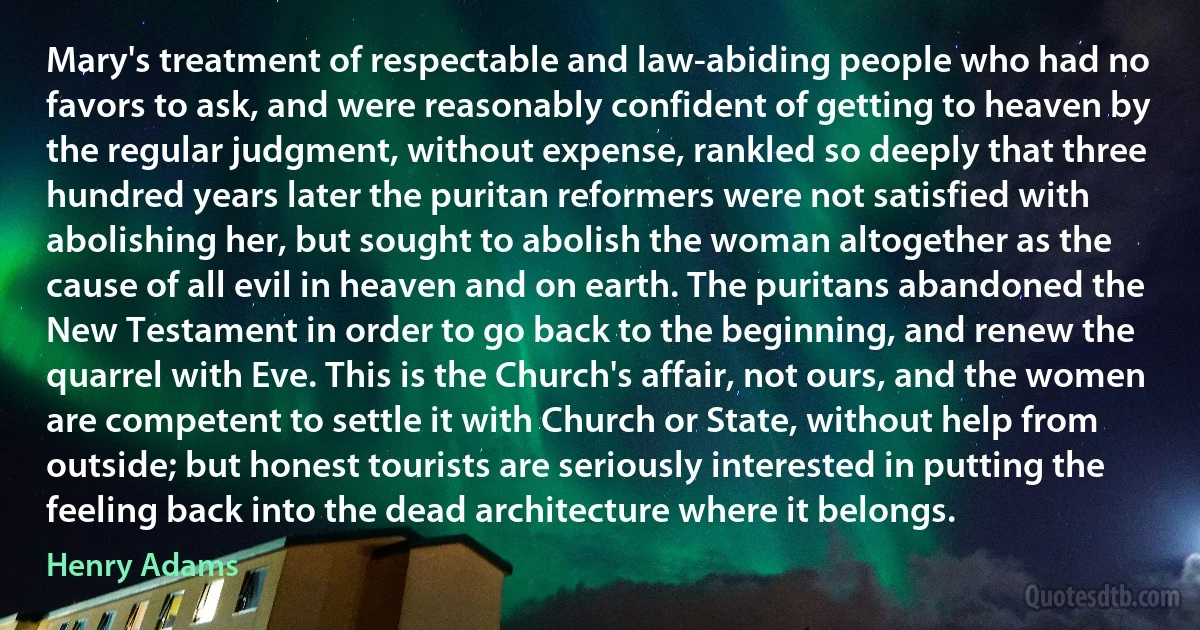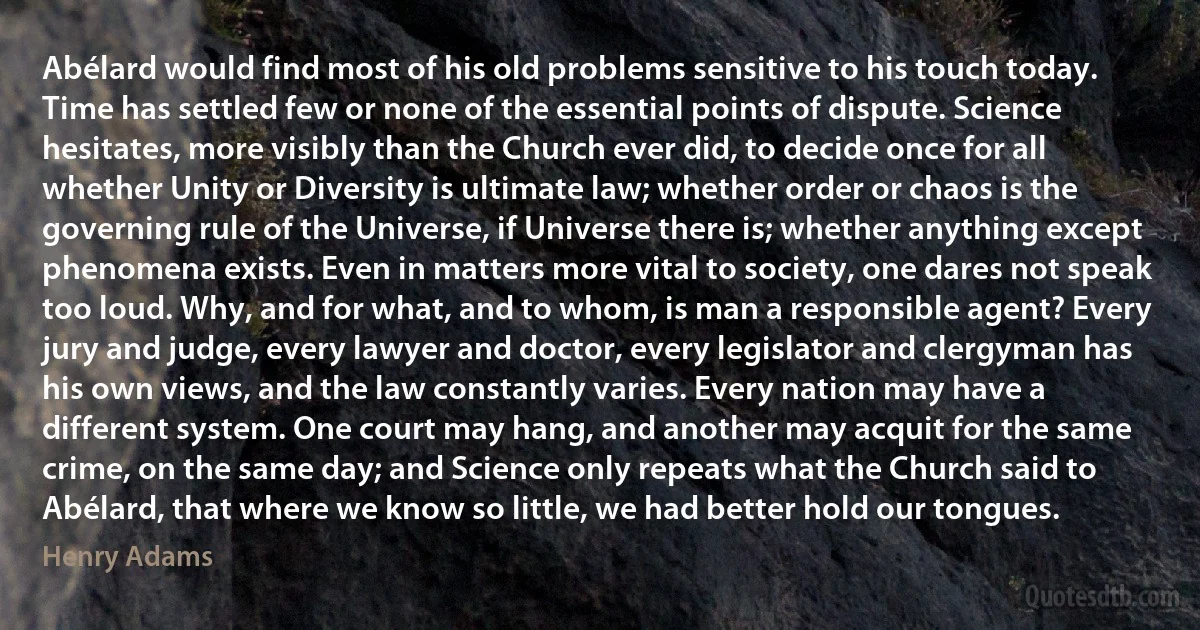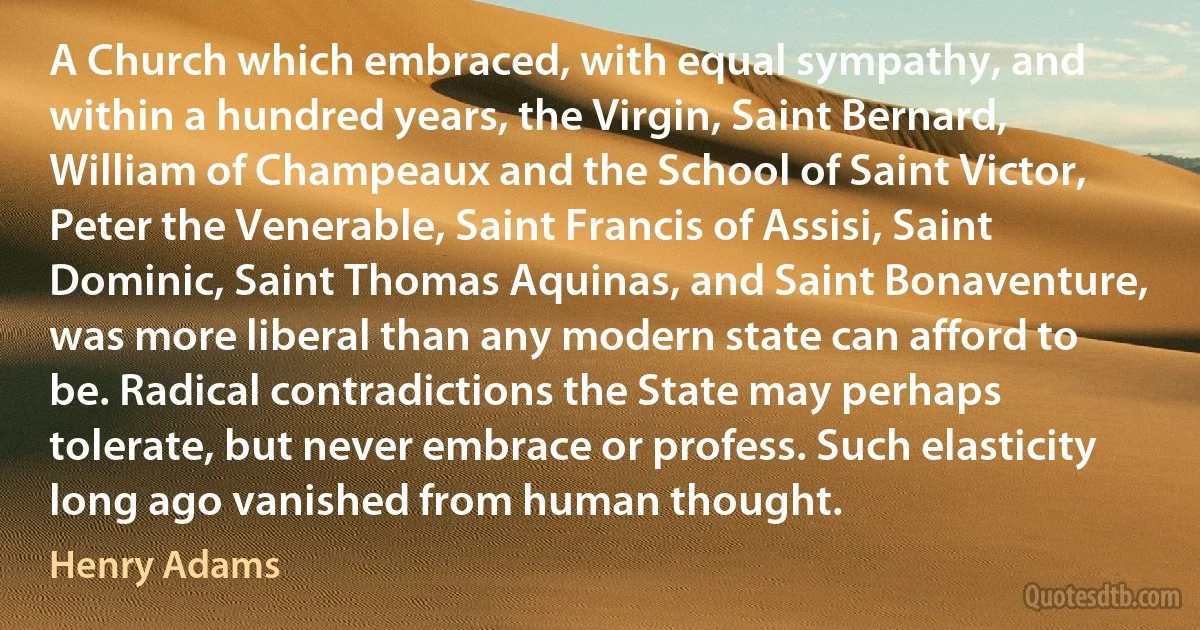Church Quotes - page 41
As for myself, if I could have removed my doubts by so simple a step as that of becoming an atheist, I should have done it, no matter what scandal or punishment had followed. I studied the subject thoroughly, and found that for one doubt removed, another was raised, only to reach at last a result more inconceivable than that reached by the church, and infinitely more hopeless besides. What do you gain by getting rid of one incomprehensible only to put a greater one in its place, and throw away your only hope besides? The atheists offer no sort of bargain for one's soul. Their scheme is all loss and no gain. At last both they and I come back to a confession of ignorance; the only difference between us is that my ignorance is joined with a faith and hope.

Henry Adams
Do you really believe in the resurrection of the body?" she asked
"Of course I do!" replied Hazard stiffly.
"To me it seems a shocking idea. I despise and loathe myself, and yet you thrust self at me from every corner of the church as though I loved and admired it. All religion does nothing but pursue me with self even into the next world.

Henry Adams
...the huge church [...] was thundering its gospel under her eyes.To have Niagara for a rival is no joke. Hazard spoke with no such authority; and Esther's next idea was one of wonder how, after listening here, any preacher could have the confidence to preach again. "What do they know about it?" she asked herself. "Which of them can tell a story like this, or a millionth part of it?"

Henry Adams
For summer tourists to handle these intricate problems in a theological spirit would be altogether absurd; but for us these great theologians were also architects who undertook to build a Church Intellectual, corresponding bit by bit to the Church Administrative, both expressing - and expressed by - the Church Architectural. Alexander Hales, Albert the Great, Thomas Aquinas, Duns Scotus, and the rest, were artists.

Henry Adams
This education startled even a man who had dabbled in fifty educations all over the world; for, if he were obliged to insist on a Universe, he seemed driven to the Church. Modern science guaranteed no unity. The student seemed to feel himself, like all his predecessors, caught, trapped, meshed in this eternal drag-net of religion.
In practice the student escapes this dilemma in two ways: the first is that of ignoring it, as one escapes most dilemmas; the second is that the Church rejects pantheism as worse than atheism, and will have nothing to do with the pantheist at any price.

Henry Adams
If you want to know what Churches were made for, come down here on some great festival of the Virgin; but come alone! That kind of knowledge cannot be taught and can seldom be shared. We are not now seeking religion; indeed, true religion generally comes unsought. We are trying only to feel gothic art. For us the world is not a schoolroom or a pulpit, but a stage, and the stage is the highest yet seen on earth. In this church the old romanesque leaps into the gothic under our eyes; of a sudden, between the portal and the shrine, the infinite rises into a new expression, always a rare and excellent miracle in thought.

Henry Adams
At Chartres Christ is identified with his Mother, the spirit of love and grace, and his Church is the Church Triumphant.
Not only is Fear absent; there is not even a suggestion of pain; there is not a martyr with the symbol of his martyrdom; and what is still more striking, in the sculptured life of Christ, from the Nativity to the Ascension, which adorns the capitals of the columns, the single scene that has been omitted is the Crucifixion. There, as everywhere in this Portal, the artists seem actually to have gone out of their way to avoid a suggestion of suffering.

Henry Adams
In fact, the Church never admitted free-will, or used the word when it could be avoided. In Latin, the term used was liberum arbitrium,- free choice,- and in French to this day it remains in strictness libre arbitre still. From Saint Augustine downwards the Church was never so unscientific as to admit of liberty beyond the faculty of choosing between paths, some leading through the Church and some not, but all leading to the next world.

Henry Adams
Never was the Church blessed with a stranger ally than this freest of free thinkers, who looked at churches very much as he would have looked at a layer of extinct oysters in a buried mud-bank. Strong's notion was that since the Church continued to exist, it probably served some necessary purpose in human economy, though he could himself no more understand the good of it than he could comprehend the use of human existence in any shape. Since men and women were here, idiotic and purposeless as they might be, they had what they chose to call a right to amuse themselves in their own way, and if this way made some happy without hurting others, Strong was ready enough to help.

Henry Adams
In this excessive display of armorial bearings - for the two Roses above are crowded with them - one likes to think that these great princes had in their minds not so much the thought of their own importance - which is a modern sort of religion,- as the thought of their devotion to Mary. The assertion of power and attachment by one is met by the assertion of equal devotion by the other, and while both loudly proclaim their homage to the Virgin, each glares defiance across the church.

Henry Adams
Even when, after centuries of license, the Church reformed its discipline, and, to prove it, burned Giordano Bruno in 1600, besides condemning Galileo in 1630 - as science goes on repeating to us every day - it condemned anarchists, not atheists. None of the astronomers were irreligious men; all of them made a point of magnifying God through his works; a form of science which did their religion no credit. Neither Galileo nor Kepler, neither Spinoza nor Descartes, neither Leibnitz nor Newton, any more than Constantine the Great - if so much - doubted Unity. The utmost range of their heresies reached only its personality.

Henry Adams
If there was in all France, between 1140 and 1200, a more typical Englishman of the future Church of England type than John of Salisbury, he has left no trace; and John wrote a description of his time which makes a picturesque contrast with the picture painted by Abélard, his old master, of the century at its beginning. John weighed Abélard and the Schools against Bernard and the Cloister, and coolly concluded that the way to truth lay rather through Citeaux, which brought him to Chartres as Bishop in 1176, and to a mild scepticism in faith. "I prefer to doubt," he said, "rather than rashly define what is hidden."

Henry Adams
The Church alone had constantly protested that anarchy was not order, that Satan was not God, that pantheism was worse than atheism, and that Unity could not be proved as a contradiction. Karl Pearson seemed to agree with the Church, but everyone else, including Newton, Darwin and Clerk-Maxwell, had sailed gaily into the supersensual.

Henry Adams
Like all great churches, that are not mere store-houses of theology, Chartres expressed, besides whatever else it meant, an emotion, the deepest man ever felt,- the struggle of his own littleness to grasp the infinite. You may, if you like, figure in it a mathematic formula of infinity,- the broken arch, our finite idea of space; the spire, pointing, with its converging lines, to Unity beyond space; the sleepless, restless thrust of the vaults, telling the unsatisfied, incomplete, overstrained effort of man to rival the energy, intelligence and purpose of God. Thomas Aquinas and the schoolmen tried to put it in words, but their church is another chapter. In act, all man's work ends there;- mathematics, physics, chemistry, dynamics, optics, every sort of machinery science may invent,- to this favor come at last, as religion and philosophy did before science was born.

Henry Adams
To hold that a state cannot, consistently with the First and Fourteenth Amendments, utilize its public school system to aid any or all religious faiths or sects in the dissemination of their doctrines and ideals does not, as counsel urge, manifest a governmental hostility to religion or religious teachings. A manifestation of such hostility would be at war with our national tradition as embodied in the First Amendment's guaranty of the free exercise of religion. For the First Amendment rests upon the premise that both religion and government can best work to achieve their lofty aims if each is left free from the other within its respective sphere. Or, as we said in the Everson case, the First Amendment has erected a wall between Church and State which must be kept high and impregnable.

Hugo Black
When I heard those parts of the Scriptures read in the Church which extol the grace of God, and lower the free-will of man, for example, 'It is not of him that willeth, or of him that runneth, but of God that sheweth mercy,' and many similar passages,-this doctrine of grace was very disagreeable to my ungrateful mind. But afterwards I began to perceive some few distant rays of light respecting this matter. I seemed to see, but by no means clearly, that the grace of God is prior, both in nature and in time, to any good actions that men can possibly perform; and I return thanks to God, from whom proceeds every good thing, for thus freely enlightening my understanding.

Thomas Bradwardine
Throughout time painting has alternately been put to the service of the Church, the State, arms, individual patronage, scientific phenomena, anecdote and decoration ... all the marvelous works that have been painted, whatever the sources of inspiration, still live for us because of absolute qualities they possess in common. The creative force and the expressiveness of painting reside materially in the colour and texture of pigments, in the possibilities of form invention and organisation, and in the flat plane on which these elements are brought into play.

Man Ray



